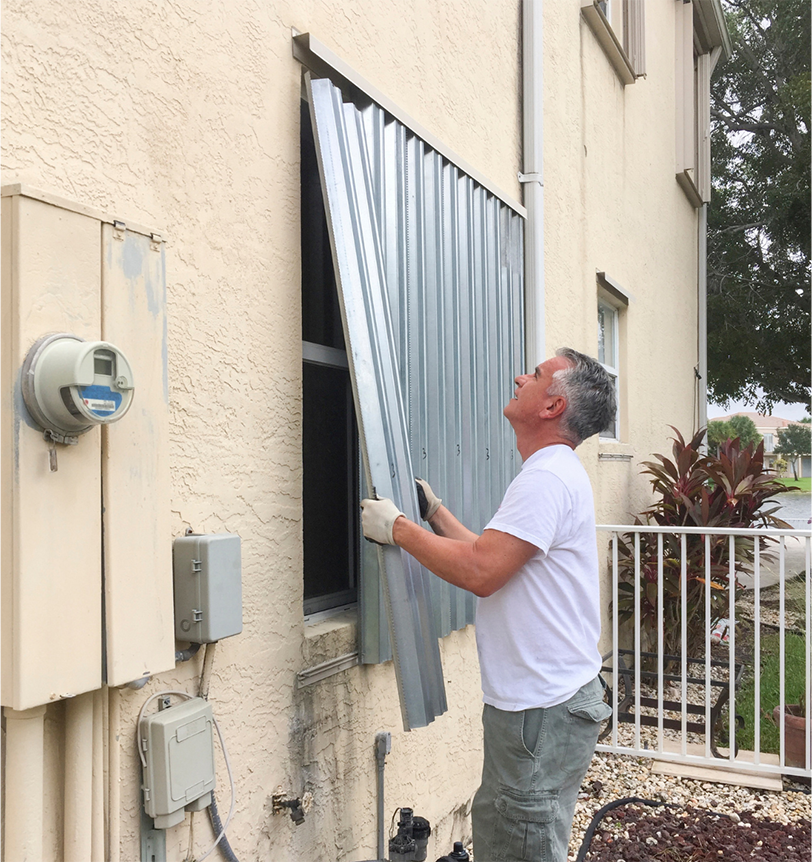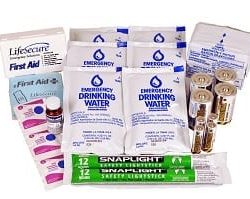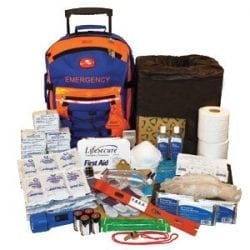Officially, the Atlantic hurricane season runs from June through November.
Expect a wild 2024 when it comes to hurricanes this summer and fall. Researchers are predicting “23 named storms and 115 named storm days,” with “a 62% chance of a Category 3, 4 or 5 hurricane making landfall on the continental U.S. coastline.”
In fact, Colorado State University predicts the highest number of hurricanes ever predicted for 2024. Hurricane researchers in Europe and at the NOAA predict the same worrisome results.
But even one hurricane can have massive ramifications for you. In 2022, Hurricane Ian caused $112.9 billion in damages with at least 61 deaths. In areas where hurricanes most commonly occur, it’s more important than ever to be prepared for hurricane season before a threat is issued in your area.
As we say at LifeSecure, “Shop before, not after.”
Essential supplies such as water and nonperishable food items sell out quickly when people panic. Once news of a hurricane reaches your local area, people will go into a shopping frenzy to ensure they have all the supplies needed to endure the storm.
If you get all your supplies before a hurricane threatens, you will be ahead of the game. Let’s break down what to put on your list and inside your hurricane survival kit.
Why does LifeSecure Care about Hurricane Preparedness?
People often ask us, “Why did you get into the emergency preparedness business?”
The truth is that I lived through a disaster and want to provide solutions to the problems I faced almost 50 years ago.
In 1970, I survived my first disaster while growing up in the Philippines.
Shortly after our move, my American expatriate family and I were welcomed to the tropics by Super Typhoon Yoling. With its sustained winds of 130 MPH, this was one of the strongest and deadliest storms on record.
Having never experienced any type of hurricane or typhoon, we were totally unprepared to weather the storm and its aftermath.
In the process of “defending” our home from the high winds, my father, my two older brothers, and I narrowly escaped injury or death from the shattering of large glass patio doors. For two weeks after the eye of the storm passed directly over our neighborhood, we lived without electricity, running water, or access to groceries.
When the storm ended, we sped to the grocery store, but we were too late. I will always remember the candles lighting row after row of totally empty shelves.
It was near Thanksgiving, so we roasted our frozen turkey on a charcoal barbecue grill. After eating the rest of our refrigerator and freezer, we lived off the rice and canned goods at home.
We lined up for water at a local public pump and carried it home in buckets on a little wagon.
These hardships taught us lessons that we will never forget. As a family, we determined never to be caught unprepared again, and we made emergency preparedness a focus.
At LifeSecure, we truly understand the importance of emergency preparedness because we’ve lived through it. We’ve experienced what it’s like to lose electricity, water, and food during and after a disaster.
We aim to help as many people as possible avoid life-threatening situations through emergency preparedness.
Should You Evacuate or Shelter in Place During a Hurricane?
When a hurricane is heading in your direction, you have two options: evacuate immediately or shelter in place. Most people will make this decision based on what local authorities recommend.
LifeSecure’s rule of thumb is “When in doubt, get out.” If you’re unsure how hard the hurricane will hit your area or if it will avoid it altogether, it’s better to be safe than sorry and evacuate just in case.
Plan to evacuate if you’re located in a vulnerable area or live in a home that cannot withstand hurricanes’ violent winds, torrential rains, and dangerous water levels.
It’s essential to be honest about whether or not your home is a safe option. Once you are trapped by the high winds and accompanying water, you will not be able to change your mind. If you do not evacuate early, there comes the point where any attempt to evacuate only exposes you to greater risk.
Many have lost their lives by staying in unsafe shelters when they would have survived had they evacuated. Our advice: if you are going to evacuate, evacuate early.
Hurricane Safety Tips for 2024
Beyond a hurricane preparedness checklist, you should know some basic hurricane safety tips to protect you and your family from incoming storms. These recommendations range from creating an evacuation plan to protecting important documents.
Stay Informed
The greatest asset during a hurricane is information. Whether it’s through the news, radio, or online, staying up to date with the latest information is key to successfully surviving a hurricane.
Local television stations often send out warnings and inform viewers about evacuation locations, but power outages are common in the midst of a storm.
To protect yourself, purchase a battery-operated radio. Most radio stations stay up during storms and provide the latest news. Rather than trying to fight cell towers, use a portable radio to protect the ones you love.
Create an Evacuation Plan
During an emergency, instinct, and memory kick in. If you and your family develop and practice an evacuation plan before a disaster, everyone will already have the information and skills needed to escape to safety as quickly as possible.
First, you should identify where you would go during a hurricane evacuation and how you would get there. Schools, churches, and other government buildings are often designated as hurricane shelters, so be prepared beforehand for where you should go.
Don’t overlook friends and family out of the area. They may provide more comfort than a hurricane shelter.
Also, account for your pets. We don’t want our four-legged friends left behind. Some shelters will be pet-friendly, but call beforehand to make sure.
Keep Important Documents Safe
Birth certificates, social security cards, and other important documents are safe from water damage by keeping them in plastic bags or safes.
While it is possible to get copies of these forms, during the stress of repairing damages and everything else that comes with the aftermath of a hurricane, keeping necessary documents away from the water allows you to worry about one less thing.
Build an Emergency Preparedness Kit
Don’t get caught off guard during a disaster. Building an emergency preparedness kit protects you and those you love from serious injuries, dehydration, and lost communication.
Whether it’s a NOAA radio or cases of safe-to-drink water, build your hurricane preparedness kit first before everyone rushes out to the store.
To make things easier, LifeSecure has everything you need to keep you and your family safe this hurricane season.
Read below to learn more about our hurricane safety products.
Hurricane Preparedness Checklist 2024
Whether you choose to evacuate or shelter in place, it’s best to prepare with a hurricane survival kit that will keep you safe in either scenario.
Goals of a hurricane kit checklist:
- Acquire medical and first aid supplies needed to treat injuries.
- Make sure you have the food, water, and materials required to shelter in place for several days without assistance.
- Be prepared to leave your home before the storm with an evacuation plan and all materials you will need to evacuate.
What Should You Put in Your Hurricane Preparedness Checklist?
An essential part of creating a hurricane kit checklist is ensuring you have all the needed materials. These materials should help you prevent serious injuries and shelter in place for at least 72 hours without emergency assistance.
At the very least, every hurricane emergency kit should include supplies such as breathing protection, first aid, and water and food. These will help you get through the storm and its aftermath.
Of course, the list doesn’t end there.
Here, we’ve made it easy for you to create your hurricane prep list. These are the items we suggest you include in your hurricane kit:
Incident management:
- Laminated evacuation plan
- Laminated shelter in place plan
Protection and shelter:
- Face masks
- Emergency thermal blankets
- Emergency ponchos
- Roll plastic sheeting
- Roll duct tape
Turning off utilities and other tasks:
- Multifunction tools include pliers, wire cutters, screwdrivers, can openers, bottle openers, utility knives, etc.
- Pair leather-palmed work gloves
Communication and light:
- Metal whistles with lanyard
- AM/FM radio with two sets of AAA batteries
- Flashlight with two sets of D batteries
- 12-hour light sticks
- LED Safety Signal
- Notepad
- Pen
- Waterproof document pouch
Hydration and nutrition:
- Water bag for carrying, purifying, and storing water (1 gallon per person)
- High-calorie food bars (at least 6 per person)
- Emergency water pouches
- Water purification tablets
Medical, hygiene, and sanitation needs:
- Personal First Aid packets
- Family First Aid kit
- First Aid Guide
- Biohazard bags
- Toilet paper roll
- Moist towelettes
- Vinyl gloves
Evacuation:
Portable backpack with the following items packed inside
- Face mask
- Thermal blanket
- Emergency poncho
- Bodywarmers
- Flashlight
- Metal whistle with lanyard
- Weather-resistant flashlight
- 12-hour light sticks
- LED Safety Signal
- Water filtration bottle
- Emergency water pouches
- High-calorie food bars
- First aid kit
- Vinyl gloves
- Toilet paper roll
- Moist towelettes
- Biohazard bags
Don’t Forget to Prepare Your Home for Hurricane Season

Hurricanes are expensive. Of the “310 billion-dollar weather disasters between 1980 and 2021, tropical cyclones (or hurricanes) have caused the most damage: over $1.1 trillion total.” Don’t let your home be the site of unwanted expenses.
LifeSecure highly recommends that you begin to physically prepare your home for hurricane season before it’s here. This includes sealing your windows, strapping your roof, cleaning the gutters, checking for leaks, etc.
Download Our Hurricane Checklist Now
It is difficult to predict how hard a hurricane will hit your town. However, one of the best qualities of hurricanes, as opposed to other natural disasters like earthquakes, tsunamis, and volcanoes, is that hurricanes usually give warnings. If you find out a hurricane is heading in your direction, it is vital to do the right thing and prepare your family and home.
Remember, preparedness is readiness in any natural disaster.
Fill out the form to download a free, printable version of the hurricane preparedness kit checklist →

*Full color and black-and-white versions of the printable checklist will be delivered to your email inbox.
![[LFS] The Ultimate Hurricane Kit Checklist - Blog Graphics](https://cdn-ceinf.nitrocdn.com/XvCfXdFMDCCVgbLepxtpVXYSZTWGYBdF/assets/images/optimized/rev-264100f/www.lifesecure.com/wp-content/uploads/2022/06/LFS-The-Ultimate-Hurricane-Kit-Checklist-Blog-Graphics.png)













